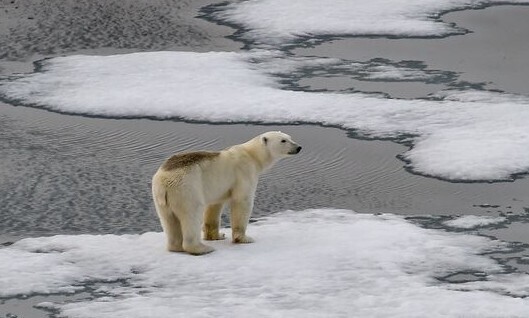hankyoreh
Links to other country sites 다른 나라 사이트 링크
Climate actions in next 10 years will determine planet’s fate, new report shows

With a carbon budget of just 500 billion tons needed to keep Earth’s average temperature from rising more than 1.5°C, climate actions over the next 10 years will determine the fate of our planet, a recent climate report suggests.
The Intergovernmental Panel on Climate Change (IPCC) announced the approval of a sixth assessment report emphasizing the urgency of short-term collective climate action during a 58th session in Interlaken, Switzerland, between March 13 and 19.
Finalized with the unanimous approval of around 650 representatives from 195 countries, the report is expected to serve as the most credible resource on climate change and a key basis for international climate negotiations going forward.
According to a “Summary for Policymakers” version of the report released on Monday, the carbon budget available for humankind to spend while still keeping the average rise in Earth’s temperature within 1.5°C amounts to just 500 billion tons.
The carbon budget refers to the total greenhouse gas emissions that human beings are allowed while keeping Earth’s temperature within a particular range. With annual greenhouse gas emissions amounting to 59 billion tons in 2019, this means only around a decade is left.
Previously, around 200 countries signed on with the 2015 Paris Agreement, according to which they would work to keep the average rise in global temperatures below 2°C — and no greater than 1.5°C — compared with pre-Industrial Revolution levels.
But greenhouse gas emissions associated with human activities have already caused the global surface temperature to rise by 1.09°C (as of 2011–2020) when compared with the period between 1850 and 1900.
As greenhouse gas emissions continue contributing to global warming, nearly all the report’s scenarios predicted a rise of 1.5°C would be reached before the year 2040.
Stressing the need to take action on the climate before it is too late, the report predicted, “The choices and actions implemented in this decade will have impacts now and for thousands of years.”
While the countries of the world have been responding to climate change through systems such as the Paris Agreement that involve voluntary greenhouse gas reductions, the report suggested that they will not only have to abide by them rigorously but also adopt an even more proactive stance.
The report further noted that households in the top 10% of emissions accounted for 34%–45% of global consumption-based greenhouse gas emissions, while the bottom 50% accounted for 13%–15%.
On that basis, observers are stressing that wealthy countries and people should be leading the way in greenhouse gas reductions, rather than poorer countries and people.
The IPCC was jointly established in 1988 by the World Meteorological Organization and United Nations Environment Programme for the scientific assessment of climate change. Every five to six years since 1990, it has released reports on research findings by scientists to date.
The latest assessment reports consisted of a compilation of six reports published between 2018 and 2023 into sections on “current status and trends,” “future climate change, risks, and long-term responses,” and “responses in the near term.”
Won Jae-gwang, director of the climate policy division at the Korea Meteorological Administration, explained that the “compilation of a general report shows the key factors that scientists are seeking to emphasize.”
By Key Min-do, staff reporter
Please direct questions or comments to [english@hani.co.kr]

Editorial・opinion
![[Editorial] Intensifying US-China rivalry means Seoul must address uncertainty with Beijing sooner than later [Editorial] Intensifying US-China rivalry means Seoul must address uncertainty with Beijing sooner than later](https://flexible.img.hani.co.kr/flexible/normal/500/300/imgdb/original/2024/0517/8117159322045222.jpg) [Editorial] Intensifying US-China rivalry means Seoul must address uncertainty with Beijing sooner than later
[Editorial] Intensifying US-China rivalry means Seoul must address uncertainty with Beijing sooner than later![[Column] When ‘fairness’ means hate and violence [Column] When ‘fairness’ means hate and violence](https://flexible.img.hani.co.kr/flexible/normal/500/300/imgdb/original/2024/0516/7417158465908824.jpg) [Column] When ‘fairness’ means hate and violence
[Column] When ‘fairness’ means hate and violence- [Editorial] Yoon must stop abusing authority to shield himself from investigation
- [Column] US troop withdrawal from Korea could be the Acheson Line all over
- [Column] How to win back readers who’ve turned to YouTube for news
- [Column] Welcome to the president’s pity party
- [Editorial] Korea must respond firmly to Japan’s attempt to usurp Line
- [Editorial] Transfers of prosecutors investigating Korea’s first lady send chilling message
- [Column] Will Seoul’s ties with Moscow really recover on their own?
- [Column] Samsung’s ‘lost decade’ and Lee Jae-yong’s mismatched chopsticks
Most viewed articles
- 1[Editorial] Transfers of prosecutors investigating Korea’s first lady send chilling message
- 2[Exclusive] Unearthed memo suggests Gwangju Uprising missing may have been cremated
- 3[Column] US troop withdrawal from Korea could be the Acheson Line all over
- 4S. Korea “monitoring developments” after report of secret Chinese police station in Seoul
- 5[Editorial] Intensifying US-China rivalry means Seoul must address uncertainty with Beijing sooner t
- 6‘Shot, stabbed, piled on a truck’: Mystery of missing dead at Gwangju Prison
- 7Could Korea’s Naver lose control of Line to Japan?
- 8Xi, Putin ‘oppose acts of military intimidation’ against N. Korea by US in joint statement
- 9US has always pulled troops from Korea unilaterally — is Yoon prepared for it to happen again?
- 10Korea’s first openly trans athlete hopes to prompt a discussion by competing as herself